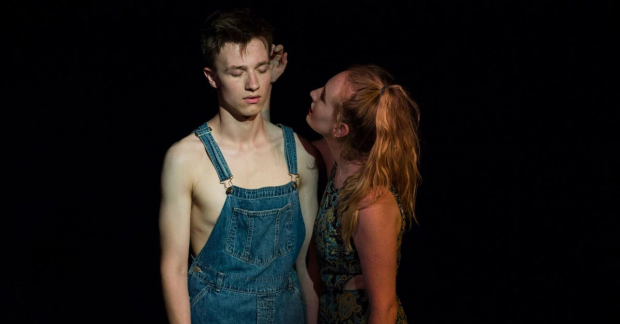Review: Man-Cub (Etcetera Theatre)
A sexy submersion into a young man’s first big club night in a production which is both naive and engaging in its rawness

© Tammana Begum
Bodies bumping, grinding, writhing, pumping, punching, shedding all inhibition and losing all control – that’s Man-Cub, a celebration of clubbing’s queer culture. At a time when London’s nightlife feels endangered, Alistair Wilkinson’s dance-led devised piece makes a case for the vitality of those spaces that spring up after-dark. They’re not just places to drink and dance, but spaces that let us let loose.
Man-Cub is a story of self-discovery. It sees gay clubs as a rite of passage, and, as the title suggests, it’s a coming-of-age piece. Young men and women, their bodies still childish, fling themselves around freely and, while it’s mostly a portrait of a kind of place, there’s a wisp of a narrative too – a young novice, so "twinky" he might well have a marshmallow core, sneaks into a gay club, perhaps for the first time.
In denim dunagrees shorts that give him the look of a raggedy lost boy, Alex Britt sits somewhere between a rabbit in the headlights and a kid in a sweetshop. Around him, men and women dance, sweat-soaked and bacchanalian. He’s patted down and eyed up, and led into a world he never knew existed by people he never thought possible.
At times, it’s as if he’s tumbled through the looking glass. These few hours – of eye contact and euphoria, of sexual possibility and thrilling anonymity – become something much bigger than a night on the tiles. It’s like Mrs Dalloway if Mrs Dalloway were off her tits and discovering her sexuality for the very first time.
Wilkinson’s own literary reference is The Jungle Book – a lost child taken in by wild animals. Bears and panthers dance together in dark corners, and clubbers snake around their prey seductively. "I Wanna Be Like You" becomes a mournful, minor-key lament sung by a spurned partyboy; a three-in-the-morning-lament. The use of the song is less glib than it sounds, largely kept beneath the surface; a way of twisting human interaction slightly out of shape.
What Man-Cub does, though, is drill into something deeper – the darker, animalistic, sexual side of clubbing. Wilkinson captures its different sides: the herd mentality; the isolation; the instant of attraction. He taps into the rhythms of the dancefloor, but also lingers on its dangerous, dirtier elements – the strangers, stuck to the sides, staring too long; the predators that circle the crowd to pick off the young.
Perhaps it’s just a stageful of scantily-clad young people dancing their socks off, but Man-Cub manages something rare in theatre. It’s genuinely sexy; bare skin and sweat sexy. Eye contact is key, but so is tactility, and there’s a real sense of exploration and improvisation onstage. One clubber examines Britt like a research scientist; another flirts from afar.
It’s young work, a debut by a director still studying at RADA, and it sometimes shows. Structurally, it’s all too sketch-like; set-piece after set-piece each set to a club banger, and when it does use text, it trips into triteness. But if Man-Cub feels naïve, incredulous at what goes on in the adult world, that’s a big part of its appeal. It’s an honest expression of wonder and adrenaline – a first foray into Heaven.
Man-Cub runs at the Etcetera Theatre until 16 July.












